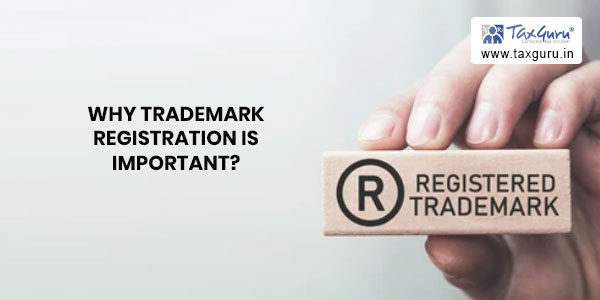INTRODUCTION:
Trade + Mark = Trademark
The trademark is the mark which depicts your trade. When people see your trademark (brand name), they can easily know the object of your business. Trademark is a marketing tool for your business. A trademark is a sign of commitment to the company, reputation, and integrity that helps the consumer in purchasing decisions.
Is a trademark the same as a trade name?
No. A “trade name” is basically the name that you have used to identify your company. It offers no legal protection or limitless rights for the use of that name; it is just the name.
Definition: Trademark defined under Section 2 (zb) of the Trade Marks Act, 1999 as,
“Trade mark means a mark capable of being represented graphically and which is capable of distinguishing the goods or services of one person from those of others and may include shape of goods, their packaging and combination of colours.”
A mark can include a device, brand, heading, label, ticket, name, signature, word, letter, numeral, shape of goods, packaging or combination of colors or any such combinations. The trademark prevents unauthorized use of an individual’s or company’s product or service without their permission.
It helps customers identify your goods or services. It’s about how customers recognize you on the market and distinguish you from your competitors. Trademarks are protected by intellectual property rights.
Trademark is segregated into 45 different classes as per the NICE classification for a trademark. Each of the trademark classes represents a distinct set of goods and services.
Category of trademark:
1. Wordmark – it includes one or more words, letters, numerals or anything written in standard character,
2. Device mark – it includes any label, sticker, monogram, logo or any geometrical figure other than word mark,
3. Colour – when the distinctiveness is claimed in the combination of colours with or without device,
4. Three dimensional trademark – it includes shape or packaging of goods,
5. Sound
WHAT CAN YOU REGISTER AS A TRADEMARK?
Name:
Product Name – Like iPod
Business Name – Like Bajaj
Person’s Name/Surname – Like Sachin Tendulkar & Shah Rukh Khan
Abbreviations – Like BMW
Logo/Symbol: Like Apple, Nike
Tagline: Like Nike’s ‘JUST DO IT’, McDonald’s ‘I’M LOVIN’ IT’, etc.
Colour Mark: Like Cadbury has trademarked the purple colour
Sound Mark: Like the corporate jingle music of the ICICI bank.
WHO IS ELIGIBLE TO APPLY FOR A TRADE-MARK?
1. Individual,
2. Partnership Firm,
3. Body-incorporate including Private Limited/limited Company,
4. Limited Liability Partnership,
5. Society
6. Trust
7. Government Department
8. Statutory Organization.
9. Association of persons
10. Hindu Undivided Family
WHY SHOULD YOU REGISTER YOUR TRADEMARK?
1. Differentiates Product & Builds Trust and Goodwill:
Did you know Dominos is a company name or brand name?
Dominos Pizza is a brand name of Jubilant FoodWorks Limited.
Did you know Maggi is a company name or brand name?
Maggi is a product of Nestlé’s.
In short, people don’t easily remember the name of the company, but they know the name of the brand. The trust and goodwill in a brand increases when it becomes popular among consumers. It helps in creating permanent customers who are loyal and always opt for the same brand.
This means that a unique brand identity creates a brand appeal and attracts relevant consumer markets to buy a product. It gets easier to market or commercialize a product with a unique brand identity which is in line with the market requirements. It creates a unique identity for you among the competitors. The brand identity lets you communicate your vision, quality and various other features of your product as well as the business enterprise.
2. Exclusive Rights:
Registered trademark owners enjoy exclusive rights over the trademark. The owner can use the same for all the products falling under the class(es) applied. Further, the owner can enjoy exclusive ownership of the Trademark.
A registered trademark gives you an exclusive right to take legal action against a party who attempts to violate your right by making unauthorized use of your trademark.
If you register your brand under a particular class it will not automatically protect your brand from ‘infringement in other classes. The idea behind the registration of a trademark is not to encourage the monopoly, but to give the owner of the trademark the necessary protection in his/her choice niche(s).
Even though unregistered trademarks that are used in connection with the sale of goods or services may have some legal protection, the burden of proof is much higher should someone copy or infringe upon your creation. Having a registered trademark gives the business owner additional protections, including presumed ownership, and reduces the burden of proof.
In short, Trademarks prevent anyone else in the same industry from using your name or logo without your permission.
3. Protects investment in Advertising & Branding:
Today’s competitive markets have made advertising and branding a must for any business. Businesses spend on a range of advertising medium such as digital media, newspaper, radio, television, etc., to promote their brand among consumers. If a brand is not trademarked, the brand can be claimed by anyone. It is therefore important to apply for a trademark before advertising campaigns start.

4. Protects against unfair competition:
If ABC Farsan Mart is not a registered brand and any third party sells the same product at low quality with the same name. In this case, the prestige of ABC Farsan Mart will be affected and this will also lead to unfair competition.
A registered trademark can be used as an effective weapon against unfair competition. Today the marketplace is filled with copycats and counterfeiters who use immorally used brand names for their own benefits. A registered trademark is an effective restriction against such unfair competition. Under trademark act, remedies are available to the owner of a trademark for unauthorized use of his or her mark or its reproduction by a third party.
5. Attract Human Resources:
Young minds want to reach the big brands because it acts like a magnet. It inspires a positive image of the organisation and thus candidates are attracted to them easily. It lowers the cost of recruitment and related activities.
6. Asset Creation:
A trademark is an intangible asset to business that adds value to it. Like in the real estate business, the value of assets appreciates over a period of time. Likewise, the value of a trademark grows exponentially as the business grows. A registered trademark is a legal privilege that may be bought, sold, franchised, assigned, or used commercially in any way. Furthermore, a trademark acts as an intangible asset in the balance sheet of a company that provides all the benefits of such assets.
7. Global Coverage:
The trademark registered in India can also be further registered in different nations internationally. For the application to be registered outside India, application along with recognized goodwill in India has to be presented.
DIFFERENCE BETWEEN TM (™) AND R (®):
TM – This symbol can be used after successfully filing a trademark application.
® – This symbol can be used only after obtaining a trademark registration certificate.
VALIDITY OF TRADEMARK:
Trademarks have 10 years of long validity and can be easily renewed.
The trademark apparently builds the trust and reputation of the goods and services associated with it. The registered mark can be presented as a symbol for the organization. No other organization can use the same to differentiate the goods and services. In case when other organization uses any registered mark, the symbol gives the right to the owner to exercise his rights in the court.
To many eyes around your brand protect your brand before it’s too late.
*****
DISCLAIMER: This article is based on the relevant provisions and to the best of my knowledge at the time of preparation of this article and moreover in no event author shall be liable for any direct and indirect result from this article and this is only a knowledge sharing initiative provided solely for information, this article is not a professional advice or recommendation.
AUTHOR: CS JINAL SHAH, JINAL SHAH & CO. Company Secretary in Practice from Surat, Gujarat and for any query fell free to contact me on 9173610133 or jinalshahco@gmail.com.





